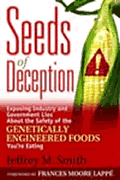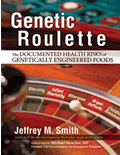Related
Articles:
Cal. County Bans Genetically Modefied Seeds (GMO's)
Hungarians
Protest Agains
GMO Grain
Other
Smith
Articles:
How to Avoid Genetically
Modefied Foods
AN
FDA-CREATED HEALTH CRISIS CIRCLES THE GLOBE
PART 1 of 2
By
Jeffrey Smith
October 21, 2007
NewsWithViews.com
Government officials around the globe have been coerced, infiltrated, and paid off by the agricultural biotech giants. In Indonesia, Monsanto gave bribes and questionable payments to at least 140 officials, attempting to get their genetically modified (GM) cotton approved.[1] In India, one official tampered with the report on Bt cotton to increase the yield figures to favor Monsanto.[2] In Mexico, a senior government official allegedly threatened a University of California professor, implying �We know where your children go to school,� trying to get him not to publish incriminating evidence that would delay GM approvals.[3] While most industry manipulation and political collusion is more subtle, none was more significant than that found at the US Food and Drug Administration (FDA).
The FDA�s �non-regulation� of GM foods
Genetically modified crops are the result of a technology developed in the 1970s that allow genes from one species to be forced into the DNA of unrelated species. The inserted genes produce proteins that confer traits in the new plant, such as herbicide tolerance or pesticide production. The process of creating the GM crop can produce all sorts of side effects, and the plants contain proteins that have never before been in the food supply. In the US, new types of food substances are normally classified as food additives, which must undergo extensive testing, including long-term animal feeding studies.[4] If approved, the label of food products containing the additive must list it as an ingredient.
There is an exception, however, for substances that are deemed �generally recognized as safe� (GRAS). GRAS status allows a product to be commercialized without any additional testing. According to US law, to be considered GRAS the substance must be the subject of a substantial amount of peer-reviewed published studies (or equivalent) and there must be overwhelming consensus among the scientific community that the product is safe. GM foods had neither. Nonetheless, in a precedent-setting move that some experts contend was illegal, in 1992 the FDA declared that GM crops are GRAS as long as their producers say they are. Thus, the FDA does not require any safety evaluations or labels whatsoever. A company can even introduce a GM food to the market without telling the agency.
Such a lenient approach to GM crops was largely the result of Monsanto�s legendary influence over the US government. According to the New York Times, �What Monsanto wished for from Washington, Monsanto and, by extension, the biotechnology industry got. . . . When the company abruptly decided that it needed to throw off the regulations and speed its foods to market, the White House quickly ushered through an unusually generous policy of self-policing.� According to Dr. Henry Miller, who had a leading role in biotechnology issues at the FDA from 1979 to 1994, �In this area, the U.S. government agencies have done exactly what big agribusiness has asked them to do and told them to do.�
Following Monsanto�s lead, in 1992 the Council on Competitiveness chaired by Vice President Dan Quayle identified GM crops as an industry that could increase US exports. On May 26, Quayle announced �reforms� to �speed up and simplify the process of bringing� GM products to market without �being hampered by unnecessary regulation.�[5] Three days later, the FDA policy on non-regulation was unveiled.
The person who oversaw its development was the FDA�s Deputy Commissioner for Policy, Michael Taylor, whose position had been created especially for him in 1991. Prior to that, Taylor was an outside attorney for both Monsanto and the Food Biotechnology Council. After working at the FDA, he became Monsanto�s vice president.
Covering up health dangers
The policy he oversaw needed to create the impression that unintended effects from GM crops were not an issue. Otherwise their GRAS status would be undermined. But internal memos made public from a lawsuit showed that the overwhelming consensus among the agency scientists was that GM crops can have unpredictable, hard-to-detect side effects. Various departments and experts spelled these out in detail, listing allergies, toxins, nutritional effects, and new diseases as potential problems. They had urged superiors to require long-term safety studies.[6] In spite of the warnings, according to public interest attorney Steven Druker who studied the FDA�s internal files, �References to the unintended negative effects of bioengineering were progressively deleted from drafts of the policy statement (over the protests of agency scientists).�[7]
FDA microbiologist Louis Pribyl wrote about the policy, �What has happened to the scientific elements of this document? Without a sound scientific base to rest on, this becomes a broad, general, �What do I have to do to avoid trouble�-type document. . . . It will look like and probably be just a political document. . . . It reads very pro-industry, especially in the area of unintended effects.�[8]
The FDA scientists� concerns were not only ignored, their very existence was denied. Consider the private memo summarizing opinions at the FDA, which stated, �The processes of genetic engineering and traditional breeding are different and according to the technical experts in the agency, they lead to different risks.�[9] Contrast that with the official policy statement: �The agency is not aware of any information showing that foods derived by these new methods differ from other foods in any meaningful or uniform way.�[10] On the basis of this manufactured and false notion of no meaningful differences, the FDA does not require GM food safety testing.
To further justify their lack of oversight, they claimed that GM crops were �substantially equivalent� to their natural counterparts. But this concept does not hold up to scrutiny. The Royal Society of Canada described substantial equivalence as �scientifically unjustifiable and inconsistent with precautionary regulation of the technology.� In sharp contrast to the FDA�s position, the Royal Society of Canada said that �the default prediction� for GM crops would include �a range of collateral changes in expression of other genes, changes in the pattern of proteins produced and/or changes in metabolic activities.�[11]
Fake safety assessments
Biotech companies do participate in a voluntary consultation process with the FDA, but it is derided by critics as a meaningless exercise. Companies can submit whatever information they choose, and the FDA does not conduct or commission any studies of their own. Former EPA scientist Doug Gurian-Sherman, who analyzed FDA review records obtained through the Freedom of Information Act, states flatly, �It is clear that FDA�s current voluntary notification process (even if made mandatory) is not up to the task of ensuring the safety of future GE [genetically engineered] crops.� He says, �The FDA consultation process does not allow the agency to require submission of data, misses obvious errors in company-submitted data summaries, provides insufficient testing guidance, and does not require sufficiently detailed data to enable the FDA to assure that GE crops are safe to eat.�[12] Similarly, a Friends of the Earth review of company and FDA documents concluded:
�If industry chooses to submit faulty, unpublishable studies, it does so without consequence. If it should respond to an agency request with deficient data, it does so without reprimand or follow-up. . . . If a company finds it disadvantageous to characterize its product, then its properties remain uncertain or unknown. If a corporation chooses to ignore scientifically sound testing standards . . . then faulty tests are conducted instead, and the results are considered legitimate. In the area of genetically engineered food regulation, the �competent� agencies rarely if ever (know how to) conduct independent research to verify or supplement industry findings.�[13]
At the end of the consultation, the FDA doesn�t actually approve the crops. Rather, they issue a letter including a statement such as the following:
�Based on the safety and nutritional assessment you have conducted, it is our understanding that Monsanto has concluded that corn products derived from this new variety are not materially different in composition, safety, and other relevant parameters from corn currently on the market, and that the genetically modified corn does not raise issues that would require premarket review or approval by FDA. . . . As you are aware, it is Monsanto�s responsibility to ensure that foods marketed by the firm are safe, wholesome and in compliance with all applicable legal and regulatory requirements.�[14]
The National Academy of Sciences and even the pro-GM Royal Society of London[15] describe the US system as inadequate and flawed. The editor of the prestigious journal Lancet said, �It is astounding that the US Food and Drug Administration has not changed their stance on genetically modified food adopted in 1992. . . . The policy is that genetically modified crops will receive the same consideration for potential health risks as any other new crop plant. This stance is taken despite good reasons to believe that specific risks may exist. . . . Governments should never have allowed these products into the food chain without insisting on rigorous testing for effects on health.�[16]
Promoting and regulating don�t mix
The FDA and other regulatory agencies are officially charged with both regulating biotech products and promoting them�a clear conflict. Suzanne Wuerthele, a US EPA toxicologist, says, �This technology is being promoted, in the face of concerns by respectable scientists and in the face of data to the contrary, by the very agencies which are supposed to be protecting human health and the environment. The bottom line in my view is that we are confronted with the most powerful technology the world has ever known, and it is being rapidly deployed with almost no thought whatsoever to its consequences.�
Canadian regulators are similarly conflicted. The Royal Society of Canada reported that, �In meetings with senior managers from the various Canadian regulatory departments . . . their responses uniformly stressed the importance of maintaining a favorable climate for the biotechnology industry to develop new products and submit them for approval on the Canadian market. . . . The conflict of interest involved in both promoting and regulating an industry or technology . . . is also a factor in the issue of maintaining the transparency, and therefore the scientific integrity, of the regulatory process. In effect, the public interest in a regulatory system that is �science based��that meets scientific standards of objectivity, a major aspect of which is full openness to scientific peer review�is significantly compromised when that openness is negotiated away by regulators in exchange for cordial and supportive relationships with the industries being regulated.�[17]
The conflict of interest among scientists at the European Food Safety Authority (EFSA) GMO Panel is quite explicit. According to Friends of the Earth, �One member has direct financial links with the biotech industry and others have indirect links, such as close involvement with major conferences organized by the biotech industry. Two members have even appeared in promotional videos produced by the biotech industry. . . . Several members of the Panel, including the chair Professor Kuiper, have been involved with the EU-funded ENTRANSFOOD project. The aim of this project was to agree [to] safety assessment, risk management and risk communication procedures that would �facilitate market introduction of GMOs in Europe, and therefore bring the European industry in a competitive position.� Professor Kuiper, who coordinated the ENTRANSFOOD project, sat on a working group that also included staff from Monsanto, Bayer CropScience and Syngenta.� The report concludes that EFSA is �being used to create a false impression of scientific agreement when the real situation is one of intense and continuing debate and uncertainty.�[18] This parallels the deceptive fa�ade at the FDA.
|
Subscribe to the NewsWithViews Daily News Alerts! |
The pro-GM European Commission repeats the same ruse. According to leaked documents obtained by Friends of the Earth, while they privately appreciate �the uncertainties and gaps in knowledge that exist in relation to the safety of GM crops . . . the Commission normally keeps this uncertainty concealed from the public whilst presenting its decisions about the safety of GM crops and foods as being certain and scientifically based.� Further, in private �they frequently criticize the European Food Safety Authority (EFSA) and its assessments of the safety of GM foods and crops, even though the Commission relies on these evaluations to make recommendations to member states. . . [and] to justify its decisions to approve new GM foods.�[19] For example, the Commission privately condemned the submission information for one crop as �mixed, scarce, delivered consecutively all over years, and not convincing.� They said there is �No sufficient experimental evidence to assess the safety.�[20] For part two click below.
Click
here for part -----> 2,
Footnotes:
1,
"Monsanto
Bribery Charges in Indonesia by DoJ and USSEC," Third World Network,
Malaysia, Jan 27, 2005,
2,
"Greenpeace
exposes Government-Monsanto nexus to cheat Indian farmers: calls on
GEAC to revoke BT cotton permission," Press release, March 3,
2005,
3,
Jeffrey M. Smith, Seeds
of Deception, (Iowa: Yes! Books, 2003), 224.
4,
See Federal Food, Drug and Cosmetic Act (FFDCA)
5,
Dan Quayle, "Speech in the Indian Treaty Room of the Old Executive
Office Building," May 26, 1992
6,
See Smith, Seeds of Deception; and for copies of FDA memos, see The
Alliance for Bio-Integrity,
7,
Steven M. Druker, "How
the US Food and Drug Administration approved genetically engineered
foods despite the deaths one had caused and the warnings of its
own scientists about their unique risks," Alliance for Bio-Integrity.
8,
Louis J. Pribyl, "Biotechnology
Draft Document, 2/27/92," March 6, 1992
9,
Linda Kahl, Memo to James Maryanski about Federal Register Document
"Statement of Policy: Foods
from Genetically Modified Plants," Alliance for Bio-Integrity(January
8, 1992)
10,
"Statement of Policy: Foods Derived from New Plant Varieties," Federal
Register 57, no. 104 (May 29, 1992): 22991.
11,
"Elements of Precaution: Recommendations for the Regulation of Food
Biotechnology in Canada; An Expert Panel Report on the Future of Food
Biotechnology prepared by The Royal Society of Canada at the request
of Health Canada Canadian Food Inspection Agency and Environment Canada"
The Royal Society of Canada, January 2001.
12,
Doug Gurian-Sherman, "Holes
in the Biotech Safety Net, FDA Policy Does Not Assure the Safety of
Genetically Engineered Foods," Center for Science in the Public
Interest,
13,
Bill Freese, "The StarLink Affair, Submission by Friends of the Earth
to the FIFRA Scientific Advisory Panel considering Assessment of Additional
Scientific Information Concerning StarLink Corn," July 17-19, 2001.
14,
FDA Letter,
Letter from Alan M. Rulis, Office of Premarket Approval, Center for
Food Safety and Applied Nutrition, FDA to Dr. Kent Croon, Regulatory
Affairs Manager, Monsanto Company, Sept 25, 1996. See Letter for BNF
No. 34
15,
See for example, "Good Enough To Eat?" New Scientist (February 9,
2002), 7
16,
"Health risks of genetically modified foods," editorial, Lancet, 29
May 1999
17,
"Elements of Precaution," The Royal Society
of Canada, January 2001.
18,
Friends of the Earth Europe, "Throwing Caution to the Wind: A review
of the European Food Safety Authority and its work on genetically
modified foods and crops," November 2004
19,
Friends of the Earth Europe and Greenpeace, "Hidden Uncertainties
What the European Commission doesn't want us to know about the risks
of GMOs," April 2006
20,
European Communities submission to World Trade Organization dispute
panel, 28 January 2005
21,
Jeffrey M. Smith, Genetic Roulette: The Documented Health Risks of
Genetically Engineered Foods, Yes! Books, Fairfield, IA USA 2007
22,
E. Ann Clark, "Food Safety of GM Crops in Canada: toxicity and allergenicity,"
GE Alert, 2000
23,
FLRAG of the PHAA of behalf of the PHAA, "Comments to ANZFA about
Applications A372, A375, A378 and A379."
24,
Judy Carman, "Is GM Food Safe to Eat?" in R. Hindmarsh, G. Lawrence,
eds., Recoding Nature Critical Perspectives on Genetic Engineering
(Sydney: UNSW Press, 2004): 82-93.
25,
Doug Gurian-Sherman,
"Holes
in the Biotech Safety Net, FDA Policy Does Not Assure the Safety of
Genetically Engineered Foods," Center for Science in the Public
Interest
26,
William Freese, "Genetically
Engineered Crop Health Impacts Evaluation: A Critique of U.S.
Regulation of Genetically Engineered Crops and Corporate Testing Practices,
with a Case Study of Bt Corn," Friends of the Earth U.S
27,
M. Cretenet, J. Goven, J. A. Heinemann,
B. Moore, and C. Rodriguez-Beltran, "Submission
on the DAR for Application A549 Food Derived from High-Lysine Corn
LY038: to permit the use in food of high-lysine corn, 2006
28,
EU Regulation 178/2002 (Article 30)
29,
Friends of the Earth Europe, "Throwing Caution to the Wind: A review
of the European Food Safety Authority and its work on genetically
modified foods and crops," November 2004
30,
"Genetically modified foods, who knows how safe they are?" CBC News
and Current Affairs, September 25, 2006
31,
Mike Zelina, et al., The Health Effects of Genetically Engineered
Crops on San Luis Obispo County," A Citizen Response to the SLO Health
Commission GMO Task Force Report, 2006
32,
Bill Lambrecht, Dinner at the New Gene
Caf�, St. Martin's Press, September 2001, pg 139
� 2007 Jeffrey M. Smith- All Rights Reserved
Sign Up For Free E-Mail Alerts
E-Mails are used strictly for NWVs alerts, not for sale
Jeffrey M. Smith is working with a team of international scientists to catalog all known health risks of GM foods. He is the author of Seeds of Deception, the world's bestselling book on GM food, and the producer of the video, Hidden Dangers in Kids' Meals.
Website: www.seedsofdeception.com
E:Mail: info@seedsofdeception.com
Genetically modified crops are the result of a technology developed in the 1970s that allow genes from one species to be forced into the DNA of unrelated species. The inserted genes produce proteins that confer traits in the new plant, such as herbicide tolerance or pesticide production.













